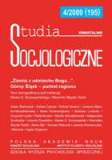Znaczenie zagranicznych migracji zarobkowych w ocenie kobiet z Opolszczyzny
Meaning of International Economic Migration for Women from Opole Region
Author(s): Anna Krasnodębska Subject(s): Social Sciences
Published by: Instytut Filozofii i Socjologii Polskiej Akademii Nauk
Keywords: wage earning migration; women; migration capital; economic migration
Summary/Abstract: The paper shows the situation of migrating women and problems which they face when they decide to seek employment abroad. Accordingly, selected fragments of various and multi-aspect studies were presented, which reveal the women’s ways of self-determination and building their own reality imbedded in migration. The author shows not only the ‘actresses’ of direct activities and experience related to migration, but also women who did not migrate to seek employment and themselves reject the thought of this eventuality. Therefore, evaluations collected from two groups of women who can function in totally different ways on the social arena are included. Through selected empirical data the author attempts to reveal to what extent their narrations are coherent. It is also important to note in what way the women who decide to migrate justify their need to do so, sometimes ignoring the information that could destroy the vision of reality the women create for themselves. Accordingly, the author presents results of quantitative (questionnaire-based interviews) and qualitative research (narration-based interviews, relations obtained from diaries). The other type, which offers a more penetrating approach, can provide information on the complicated mechanisms of migration processes and bring closer the answer to the question of what happens on the micro-social level, on the plane of an individual’s behavior, her vicissitudes and family. Reasons behind the migration of women are presented, as well as the possibilities which they themselves perceive in connection with their employment abroad and the work itself, its organization and relations with employers. The situation in which the migrating women find themselves is complemented by their evaluation of other Poles with whom they work. Finally, the author presents selected empirical data which reflect changes in the lives of the respondents and testify as to what they are and what they became as a result of migration.
Journal: Studia Socjologiczne
- Issue Year: 195/2009
- Issue No: 4
- Page Range: 251-272
- Page Count: 22
- Language: Polish

